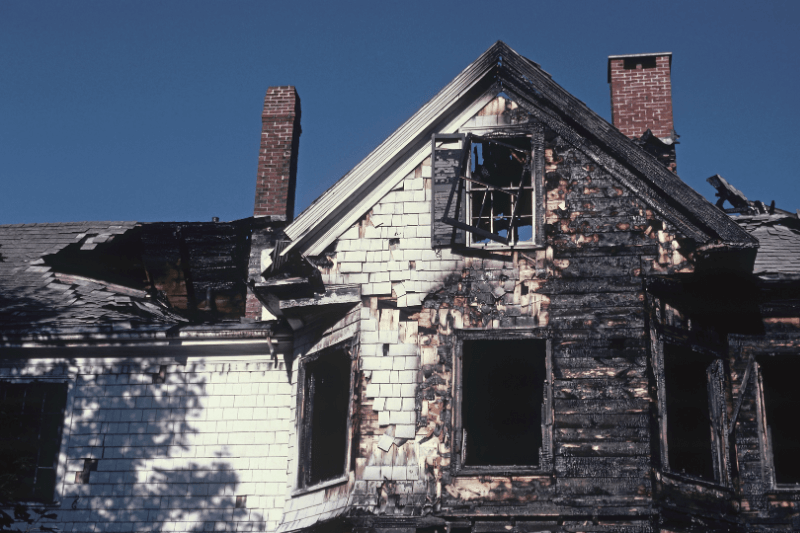
This pressing question gains significance in an era where fire incidents, from wildfires to accidental house fires, concern many.
Understanding your homeowner insurance policy is necessary and crucial in safeguarding your home and peace of mind. It’s about comprehending the extent of your coverage, encompassing everything from dwelling and personal property to additional living expenses after a fire.
This guide will clarify the intricacies of homeowners insurance concerning fire damage, ensuring you’re thoroughly informed. Let’s explore the coverage details and what they mean for you in the event of a fire.
Does Homeowners Insurance Cover Fire Damage?
Homeowners’ insurance generally covers fire damage, including losses from accidental fires. When an accidental fire occurs, homeowners can file an insurance claim with their home insurance company to seek compensation for damages.
Typically, home insurance covers the cost of repairing or rebuilding the damaged property and replacing personal belongings lost in the fire. Reviewing your policy details is important, as coverage limits and exclusions can vary.
Promptly contacting your insurance company after an accidental fire ensures a smooth claims process and timely coverage of the incurred losses.
Levels of Coverage of Home Insurance
When protecting your home in Waukesha or Fox Point, understanding the different levels of home insurance coverage is key. Each type of coverage plays a vital role in ensuring you’re comprehensively protected against various risks, including fire damage.
Let’s break down these levels to see how each contributes to your insurance safety net.
Dwelling Coverage
Dwelling coverage is the foundation of your homeowner’s insurance policy. It specifically addresses the costs associated with rebuilding or repairing your home if it’s damaged by a covered peril, like fire.
This coverage extends up to your policy’s dwelling coverage limit, ensuring that the structure of your home, including walls and roofs, is financially protected.
It’s crucial to ensure that your dwelling coverage limit aligns with the current rebuilding costs, considering factors like construction prices and any home improvements you’ve made.
Personal Property Coverage
Your home is more than just walls and a roof; it’s filled with valuable personal belongings. Personal property coverage protects these items, from furniture to electronics, against loss or damage due to fire and water leakages.
This coverage typically reimburses you for the replacement cost or the actual cash value of the items, factoring in depreciation. It’s important to have an up-to-date inventory of your belongings and understand the limits of this coverage, as some high-value items might require additional insurance.
Liability Coverage
Liability coverage is an often overlooked but essential part of your homeowner’s insurance. It protects you financially if someone is injured on your property and you’re found legally responsible.
For example, suppose a visitor gets injured in a fire accident at your residence. In that case, this insurance coverage can assist in paying for their medical bills and any legal costs if they decide to file a lawsuit. This coverage is a vital protection that provides peace of mind in potential legal disputes.
Additional Living Expenses
If a fire makes your home uninhabitable, additional living expenses coverage comes into play. It covers the costs of temporary housing and living expenses while your home is being repaired or rebuilt.
This can include hotel bills, restaurant meals, and other necessary expenses above your usual living costs. It’s an invaluable part of your policy, ensuring that a devastating event like a fire doesn’t leave you financially strained while you’re displaced from your home.
What If You Don’t Have Homeowner Insurance?
Homeowners’ insurance can leave you in a safe position, far beyond the scope of fire damage. Imagine facing a natural disaster, theft, or accidental property damage without any financial safety net.
Without insurance, the responsibility to cover all repair and replacement costs falls squarely on your shoulders. This could mean significant financial hardship, especially if you face substantial damages or loss.
For instance, if a storm damages your roof or a burglar breaks into your home, the costs to repair your home and replace stolen items can be excessive.
Additionally, liability risks are a serious concern. If someone is injured on your property, you could face expensive legal battles and potential compensation costs without the protective buffer of liability coverage.
Sell Your Fire-Damaged House In With Us!
We buy damaged houses in Wisconsin and for cash for the best value in the market. Just fill out the form below or give us a call at: (414) 488-0082 to get your free, no-obligation cash offer!
Sell your house as-is, without running an inspection. We make selling your house a simple affair.
What If Your Insurance Doesn’t Cover Fire Damage?
Discovering that your homeowner’s insurance does not cover fire damage can lead to significant and multifaceted consequences. Here’s an overview of the potential impacts.
Financial Strain from Rebuilding Costs
One of the most immediate and pressing consequences of not having home insurance is the financial burden of rebuilding or repairing your home.
Without insurance coverage, the responsibility of funding the reconstruction falls entirely on you. This can be a substantial financial challenge, especially considering the high costs associated with construction, materials, and labor.
Loss of Personal Belongings Without Recompense
Another critical impact is the loss of personal belongings. Fire can destroy furniture, electronics, clothing, and other valuable items. With personal property coverage, you can avoid the daunting task of replacing these items at your own expense, which can add up to a significant amount.
Legal and Liability Issues
If the fire spreads and causes damage to neighboring properties or injures someone, you could face serious legal and liability issues. Without liability coverage, any claims made against you for property damage or bodily injury could result in substantial legal costs and compensation payouts.
Long-Term Financial Implications
The long-term financial implications can be severe. The cost of rebuilding and replacing belongings and potential legal liabilities can deplete savings, lead to debt, and impact your financial stability for years.
Emotional and Psychological Stress
Beyond the financial aspects, the lack of coverage can exacerbate the emotional and psychological stress typically experienced after a fire. The uncertainty and burden of managing the aftermath without financial support can be overwhelming, impacting your overall well-being.
Difficulty in Securing Future Insurance
Finally, experiencing a significant fire loss without coverage might affect your ability to secure affordable homeowners insurance in the future. Insurance companies may view you as a higher risk, leading to increased premiums or difficulty finding comprehensive coverage.
Your Insurance Doesn’t Cover Fire Damage: Here’s What To Do
Discovering that your homeowner’s insurance doesn’t cover fire damage can be unsettling. However, there are proactive steps you can take to address this gap in your coverage.
It’s essential to act swiftly to ensure you’re adequately protected for the future. Let’s explore the steps to enhance your insurance coverage and safeguard your home against fire damage.
Review Your Policy
Firstly, thoroughly review your existing homeowner’s insurance policy. Look for details about fire damage coverage, including exclusions or limitations.
Understanding the fine print of your policy is crucial. It helps you identify exactly what is and isn’t covered, including details about dwelling coverage, personal property coverage, and additional living expenses.
This review can reveal gaps in your coverage that you weren’t previously aware of, providing a clear starting point for enhancing your insurance protection.
Contact Your Insurance Agent
Once you’ve reviewed your policy, the next step is to contact your insurance agent. They can clarify your current coverage and help explore options for additional protection against fire damage. This might involve adjusting your existing policy or discussing the feasibility of adding specific fire insurance coverage.
Your agent can also advise on the best course of action based on your unique situation, whether it’s increasing your dwelling coverage limit, adjusting your premiums, or considering different types of coverage.
Consider Additional Policies
Sometimes, more than your current homeowner’s insurance policy may be required to cover fire damage, especially if you’re at a higher risk due to location or other factors. If this is the case, consider purchasing additional policies.
Separate fire insurance coverage or a more comprehensive home insurance policy can provide the extra protection you need.
These policies can offer broader coverage for fire damage, including structure coverage for detached garages, replacement cost coverage for personal belongings, and even coverage for smoke damage.
Evaluate Your Home’s Fire Risk
Assessing your home’s fire risk is an important step. This involves evaluating factors like the age and condition of your home, the presence of fire extinguishers and smoke detectors, and potential fire hazards like electrical fires.
Understanding these risks can guide you in making informed decisions about your insurance needs and may help you reduce your premiums by implementing fire safety measures.
Plan for the Future
Finally, planning for the future is key. This includes regularly reviewing and updating your insurance policy to reflect changes in your living situation, such as home renovations or purchasing new high-value items.
Staying proactive about your insurance coverage ensures you’re always prepared for the unexpected, providing peace of mind and financial security.
Lastly, it would be best if you consider the possibility of selling your house for cash in the future. This is applicable if you see the coverage is not enough, or if the costs of selling your house or fixing it up are too steep.

Securing Your Future: The Importance of Adequate Homeowners Insurance
Understanding and ensuring adequate homeowners insurance coverage is not just a precaution; it’s a vital step in securing your home and financial future.
Whether it’s protecting against fire damage, theft, or liability risks, a comprehensive homeowners insurance policy is your first line of defense. Regularly reviewing your policy, staying informed about coverage limits, and being proactive about potential risks are key to maintaining peace of mind.
Remember, homeowners insurance isn’t just a policy; it’s a crucial investment in your home’s safety and your family’s well-being. Take advantage of an unforeseen event to reveal gaps in your coverage.
Take action now: review your policy, consult your insurance agent, and make the necessary adjustments to ensure your coverage meets your needs. By being well-prepared, you can confidently face whatever challenges come your way. Cream City Home Buyers can help you through personalized insurance knowledge.
